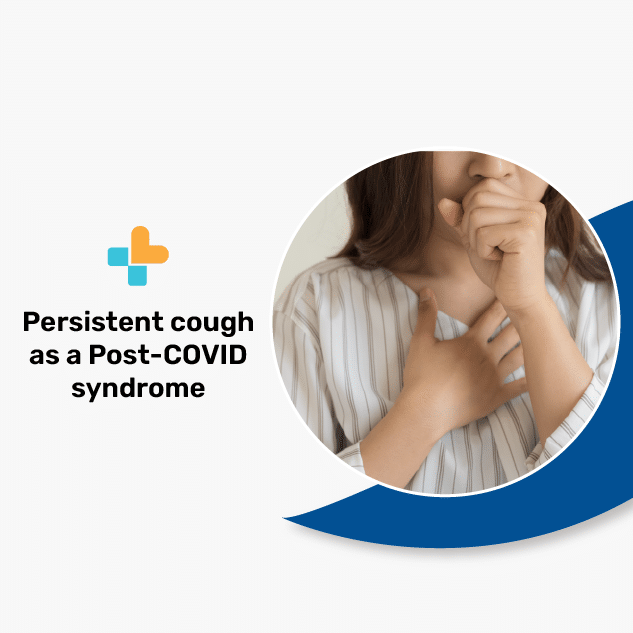COVID-19 infection has taken a toll on almost everyone’s health who has been affected by the virus. Starting with a mild cough to difficulty breathing, coronavirus disease has resulted in a wide range of symptoms in different individuals. 60-70% of the patients with COVID-19 presented dry cough as one of the most common initial symptoms. A recent study mentions that cough is a significant symptom in the acute phase of COVID, which persists as a long-term effect in the post-infection phase along with other symptoms like cognitive impairment, chronic fatigue, and muscle These long-term effects are collectively termed as long COVID or post-COVID syndrome. Cough increases the chances of community transmission through the respiratory droplets of an infected person.
A post-COVID cough might result from SARS-CoV-2 invading the vagal sensory neurons or neuroinflammatory response, or the chances are that it might be due to both the underlying reasons. This invasion of SARS-CoV-2 leads to peripheral and central hypersensitivity of cough pathways. However, there is a need for a further hypothesis to justify the neuroinflammatory response that affects various parts of the brain, thereby resulting in cough, chronic fatigue and muscle pain.
Causes of COVID-19 associated cough
There isn’t much known about cough as a post-COVID syndrome. But, from the little available evidence, it is understood that respiratory comorbidities, severe acute COVID-19 infection and being a female can increase the chances of the post-COVID syndrome. Unlike cough that is seen after a common cold or flu infection, chronic cough associated with the post-COVID syndrome is accompanied by other manifestations or shared mechanisms of the underlying COVID symptoms. The existing clinical tools make it easier to characterize cough in terms of severity, frequency, and hypersensitivity. This helps to understand the relationship and implications of COVID-19 cough with other co-existing symptoms.
Mechanism of cough in COVID-19 infection
A cough is a reflex action that happens by activating vagus nerves (peripheral sensory nerve) that provides an input to the brainstem. In the case of chronic cough, these cough pathways that transmit signals to the brainstem get sensitized. In the case of COVID-19, there are chances that SARS-CoV2 infects the sensory nerves that mediated cough, thereby causing neuroinflammation and neuroimmune interactions. It is suspected that SARS-CoV2 might interfere directly with the sensory neurons as we already know that patients with COVID-19 infection have presented with olfactory and taste impairment. Having said that, although there is less much known about it, SARS-CoV2 does cause sensory dysfunction.
How to manage COVID-19 associated cough?
It is quite common that most of the people who present cough resulting from viral infections rely on over-the-counter medications to control the cough. However, the effect of such medicines in treating post-COVID cough remains unclear. Patients with a post-COVID cough should get targeted intervention to manage the cough. Although several treatments are available to address COVID-19 associated cough, the benefits in relieving cough associated with acute viral infection remain unclear.
So far, opioid-derived antitussives are recommended by medical professionals. These opiates are known to show their effect on the cough reflex network in the brainstem, thereby helping suppress the cough, especially in the early stages. Anatomical diagnosis is essential to identify the reasons that are contributing to COVID-19 associated cough. Some of the underlying causes of cough resulting from post-COVID infection could be gastro-intestinal reflux disease, lung fibrosis, ACE inhibitor therapy, or airways inflammation.
In conclusion, there isn’t a piece of complete information to understand the prevalence, frequency, and persistence of COVID-19 associated cough. There is a requirement for more trials to understand the mechanisms of how SARS-CoV-2 invades and activates the vagal sensory neurons that are affected by the process of neuroinflammation and neuro-immunity. Visit our website to book an appointment or call us at +91 08069489584 for a consultation.
If you need additional information or would like to speak with a professional, feel free to contact us right away at +91 636-610-0800 or book an appointment on our website.
Our Hospital Locations
General Surgery Hospitals in Chandigarh | General Surgery Hospitals in Bangalore | General Surgery Hospitals in Jaipur | General Surgery Hospitals in NCR | General Surgery Hospitals in Hyderabad
Our Doctors
General Surgery Doctors in Chandigarh | General Surgery Doctors in Bangalore | General Surgery Doctors in Jaipur | General Surgery Doctors in NCR | General Surgery Doctors in Hyderabad
About the Author

Dr. S. Goel
Dr. S. Goel is a renowned Internal Medicine Specialist currently practicing at Ayu Health, Bangalore. He is a Specialist in Internal Medicine, Diabetes HTN, Paediatric Care, and Family Medicine.




